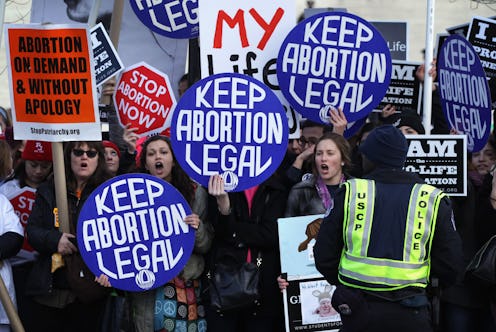Life
Anti-Abortion Laws Don't Reduce The Abortion Rate
Whatever your stance on abortion, it turns out you should probably be against anti-abortion laws. New research shows that laws against abortion don't decrease the abortion rate. That same research has identified a few things that do decrease the abortion rate; they're just probably not the sorts of solutions you hear discussed at pro-life meetings.
The abortion rate has declined dramatically in recent decades — not only in the United States, but globally as well. But new research published in Lancet shows that this decline is probably not due to any changes in abortion law. Researchers looked at abortion trends between 1990 and 2014 and found that in countries where abortion is illegal or only legal to save the life of the mother, the annual abortion rate is roughly 37 per 1,000 women of reproductive age. In countries where abortion is legal in most cases, the annual rate is about 34 per 1,000 women of reproductive age. In other words, it doesn't seem likely that placing legal restrictions on abortion makes it less common.
What's more, researchers found that while the abortion rate is falling in most places, it's declining faster in some places than in others. The annual abortion rate declined dramatically in the developed world during this time period, from about 46 to about 27 per 1,000 women of reproductive age. In the developing world, there was only a two-point decline, from 39 to 37 per 1,000. Researchers believe this to be an indication that access to sexual and reproductive health care is a major factor in reducing the abortion rate.
In other words, banning abortion doesn't end it; providing birth control and other forms of reproductive health care do. Basically, if you really want to end abortion, instead of trying to defund Planned Parenthood, people should be tripping over themselves to give the organization more money.
This latest research fits well with past findings on the subject, which tend to show that abortion restrictions only make women more likely to seek illegal and unsafe abortions, not to have fewer abortions. But while this has major implications for the way we approach abortion policy and reproductive health access in this country, the biggest implications are for women in the developing world.
Not only do people in such countries have less access to reproductive health care, including affordable, reliable birth control, but developing nations are also more likely to have anti-abortion laws. Although there are notable exceptions, such as Uruguay and South Africa, most countries in Latin America, the Middle East, Africa, and Southern Asia have heavy restrictions on abortion. This means that women in these countries are not only more likely to have an unwanted pregnancy, but are also more likely to then need to seek out an illegal, probably unsafe abortion, should they want one.
It's all the more reason to support the efforts of women around the world to gain access to better reproductive health care, including abortion, and to fight against the people in our own country who want to reverse all the progress that has been made in the United States on these issues. Because the truth is that banning abortion, reducing affordable birth control access, and closing clinics that provide reproductive health care doesn't reduce the number of abortions that happen in a given year. It only punishes the people who need these services. And that's a fact.
Image: Giphy
